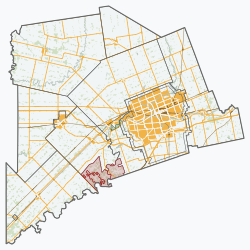Indian reserve in Ontario, Canada
| Munsee-Delaware Nation Nalahii Lunaapewaak | |
|---|---|
| Indian reserve | |
| Munsee-Delaware Nation Indian Reserve No. 1 | |
  | |
| Coordinates: 42°48′N 81°29′W / 42.800°N 81.483°W / 42.800; -81.483 | |
| Country | |
| Province | |
| County | Middlesex |
| First Nation | Munsee-Delaware |
| Formed | 1967 |
| Government | |
| • Chief | Roger Thomas |
| • Federal riding | Lambton—Kent—Middlesex |
| • Prov. riding | Lambton—Kent—Middlesex |
| Area | |
| • Land | 11.22 km (4.33 sq mi) |
| Population | |
| • Total | 160 |
| • Density | 14.3/km (37/sq mi) |
| Time zone | UTC-5 (EST) |
| • Summer (DST) | UTC-4 (EDT) |
| Postal Code | N0L |
| Area code(s) | 519 and 226 |
Munsee-Delaware Nation (Munsee: Nalahii Lunaapewaak, meaning: Lenapes from the Upstream, in contrast with The Lenape at Moraviantown, referred to as "Downstrean Lenapes") is a Lenape First Nations band government located 24 kilometres (15 mi) west of St. Thomas, in southwest Ontario, Canada.
Known previously as the Munsee of the Thames, their land base is the 1,054 hectares (2,600 acres) Munsee-Delaware Nation 1 reserve, with the unincorporated community of Muncey, west from the Oneida Nation of the Thames, as their main community. The reserve is splintered into several non-contiguous areas, made up of individual lots within the Chippewas of the Thames reserve. As of January 2014, their registered population was 612 people, though only 148 lived on their own reserve.
History
Members of the Munsee branch of the Lenape nation arrived in the area in the 18th century. John Graves Simcoe, the lieutenant governor, encouraged the Munsee to settle there although Chippewa were already established there. In 1819 the Chippewa of the Thames reserve was established, and in 1840 the Munsee and the Chippewa finally reached an agreement to share the land. In 1967 the Munsee portion became part of the current reserve, which was established by Order in Council.
Demographics
The Munsee-Delaware First Nation had a registered population of 524 in April 2004, of whom 163 lived on the reserve. By January 2011, the nation had a total registered population of 555, of whom 145 lived on the reserve.
| 2021 | |
|---|---|
| Population | 129 (−15.7% from 2016) |
| Land area | 11.19 km (4.32 sq mi) |
| Population density | 11.5/km (30/sq mi) |
| Median age | 38 (M: 40.4, F: 34.8) |
| Private dwellings | 55 (total) |
| Median household income |
Governance
Munsee-Delaware Nation's Chief and Council are elected officials who serve a two (2) year term of office. Elections are governed by their own Band Custom Election Code. Chief and Council are directly accountable to the band membership for the success of the Nation and the conduct of its affairs and for carrying out the community's mission and vision.
The history of Munsee-Delaware Nation elected Chief and Council are:
- 2014 / 2016 Term - Chief Roger Thomas, Head Councillor Aaron Dolson Jr., Councillor Ryan Peters, Councillor Rose Snake, Councillor Candy Thomas
- 2012 / 2014 Term - Chief Patrick Waddilove, Head Councillor Rose Snake, Councillor Frank Cooper, Councillor Dean Snake, Councillor Leander Snake
- Bi-election August 3, 2013 - Chief Roger Thomas
- 2010 / 2012 Term - Chief Patrick Waddilove, Head Councillor Rose Snake, Councillor -
Services
- Administration
- Community Centre (which provides ready access to health care and police services)
- Child Care Centre
- Ontario Works
See also
References
- ^ "Munsee-Delaware Nation 1 community profile". 2011 Census data. Statistics Canada. Retrieved 3 June 2015.
- Indian and Northern Affairs Canada - First Nation Profiles: Registered Population Munsee-Delaware Nation
- "2021 Community Profiles". 2021 Canadian census. Statistics Canada. February 4, 2022. Retrieved 2022-04-27.
- "2006 Community Profiles". 2006 Canadian census. Statistics Canada. August 20, 2019.
- "2001 Community Profiles". 2001 Canadian census. Statistics Canada. July 18, 2021.
External links
- AANDC profile
- Southern First Nations Secretariat: Munsee-Delaware First Nation
- Munsee-Delaware Nation 1 at Aboriginal Canada Portal
- Munsee-Delaware First Nation at Chiefs of Ontario (number 76)
| Places adjacent to Munsee-Delaware Nation | ||||||||||||||||
|---|---|---|---|---|---|---|---|---|---|---|---|---|---|---|---|---|
| ||||||||||||||||
| Anishinabek Nation | |
|---|---|
| Lake Superior Region | |
| Lake Huron Region |
|
| Southwest Region | |
| Southeast Region | |
| Association of Iroquois and Allied Indians | |
|---|---|